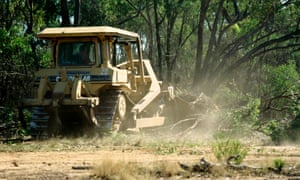Scientists say the greatest loss of threatened species habitat has been in the agriculture minister’s electorate
Most clearing of Australian habitat relied on by threatened species
is concentrated in just 12 federal electorates, nine of which are held
by the Coalition, an analysis has found.
University of Queensland scientists found more than 90% of the threatened species habitat lost since the turn of the century has been in six electorates in Queensland, two each in NSW and Western Australia and one in Tasmania and the Northern Territory.
The study, commissioned by the Australian Conservation Foundation, comes in the wake of a United Nations global assessment that found biodiversity is being lost at an unprecedented rate, with one million species at risk of extinction. The report warns the decline in native life could have implications for human populations across the globe.
The research found the greatest loss of threatened species habitat in Australia had been in the agriculture minister David Littleproud’s electorate of Maranoa, in southern Queensland. Nearly two million hectares, or 43%, has been cleared since 2000, when the federal Environment Protection and Biodiversity Conservation Act was introduced. Among the 85 threatened species affected are the koala, the greater bilby, the black-throated finch and the long-nosed potoroo.
Maranoa is followed on the list by Kennedy, home to the maverick
independent Bob Katter, the Liberal Rick Wilson’s Western Australian
seat of O’Connor and Capricornia, a marginal electorate held by the
LNP’s Michelle Landry.University of Queensland scientists found more than 90% of the threatened species habitat lost since the turn of the century has been in six electorates in Queensland, two each in NSW and Western Australia and one in Tasmania and the Northern Territory.
The study, commissioned by the Australian Conservation Foundation, comes in the wake of a United Nations global assessment that found biodiversity is being lost at an unprecedented rate, with one million species at risk of extinction. The report warns the decline in native life could have implications for human populations across the globe.
The research found the greatest loss of threatened species habitat in Australia had been in the agriculture minister David Littleproud’s electorate of Maranoa, in southern Queensland. Nearly two million hectares, or 43%, has been cleared since 2000, when the federal Environment Protection and Biodiversity Conservation Act was introduced. Among the 85 threatened species affected are the koala, the greater bilby, the black-throated finch and the long-nosed potoroo.
The environment minister Melissa Price’s vast electorate of Durack, which covers nearly two-thirds of Western Australia, is seventh, with more than 300,000 hectares lost.
Other seats on the list are Flynn, Parkes, Leichhardt, Lingiari, Farrer, Dawson and Lyons.
James Watson, the director of the university’s centre for biodiversity and conservation science, said Australia was sleep-walking through a worsening extinction crisis.
“These results show the laws we have to protect our wonderful natural heritage are not working and that is a significant failure of government,” he said.
The Australian Conservation Foundation’s nature policy analyst, James Tresize, said the next Australian government must invest in the recovery of threatened species and introduce strong environment laws overseen by an independent national regulator if it was serious about reversing the decline in native wildlife.
Labor has promised to reform national environment laws by introducing new legislation and a federal environment protection authority but has not spelt out what powers it would have. The Coalition says it will review the existing laws, as required under legislation, but does not plan to replace them.
Australia has the highest rate of mammal extinction in the world over the past 200 years. Funding to the national environment budget has fallen by more than a third since the Coalition was elected.
In response to the UN report, Price said the Coalition was committed to investing in the protection of native species and their habitats. It has promised a $100m environment restoration fund to clean up coasts and waterways, protect species, increase recycling and reduce waste.
The Labor environment spokesman, Tony Burke, said Labor was alarmed by the results of the report and would engage on environmental issues in the international arena, a space he said the Liberals had vacated. It included talks on biodiversity, climate change, ocean protection and international heritage conventions. Labor has promised a $100m native species fund.
A global meeting on the convention on biological diversity will be held in Kunming, China next year.

No comments:
Post a Comment